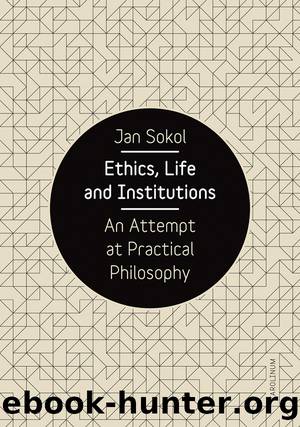Ethics, Life and Institutions. an Attempt at Practical Philosophy by Sokol Jan;Cairns Neil;Pauzerová Markéta;

Author:Sokol, Jan;Cairns, Neil;Pauzerová, Markéta; [Sokol, Jan]
Language: eng
Format: epub
Tags: PHI000000 PHILOSOPHY / General; PHI005000 PHILOSOPHY / Ethics & Moral Philosophy
Publisher: Karolinum Press
Published: 2019-07-21T00:00:00+00:00
1) The natural law is given by God the Creator, and 2) it necessarily applies to all human beings, 3) who can, through the exercise of reason, come to know it. 4) The good logically precedes the right, so that 5) right action is that which corresponds to the good and 6) is not fundamentally flawed or blemished. 7) Some of these flaws in action can be proscribed by universal rules, such as the Ten Commandments.316
The fourth and fifth points connect the natural law with the searching after ends and virtues, whereas the sixth precludes the possibility that a person could attain a good end through bad means. In this form, the idea of natural law determined a considerable amount of modern moral thinking and Christian doctrine. It also played a decisive role in the formation of modern natural law as unconditional corrective against the despotism of lawmakers; our notion of human rights is also based on this.
Most modern theories of morality have attempted to avoid referring to the divine origin of natural law, emphasising instead its accessibility to reason. But if the content of natural law is not positively expressed in divine revelation, it must have as a prerequisite some form of âreal existenceâ; this is why we speak of âmoral realismâ in the contemporary debate. Critics of the ethics of knowable good object primarily to this âexistenceâ; this is really a formal objection. Others point to the variety of moral ideas in different cultures and finally to the problematic nature of all general moral rules. According to Bernard Williams, debate is made more difficult as many thinkers regard moral theories as âaggressive weaponsâ with which to destroy their opponents (through logic). The correct response to that is a reminder of Aristotleâs âproportionateâ accuracy; practical philosophy is not logic.
Download
This site does not store any files on its server. We only index and link to content provided by other sites. Please contact the content providers to delete copyright contents if any and email us, we'll remove relevant links or contents immediately.
| Anthropology | Archaeology |
| Philosophy | Politics & Government |
| Social Sciences | Sociology |
| Women's Studies |
The remains of the day by Kazuo Ishiguro(8977)
Tools of Titans by Timothy Ferriss(8366)
Giovanni's Room by James Baldwin(7330)
The Black Swan by Nassim Nicholas Taleb(7109)
Inner Engineering: A Yogi's Guide to Joy by Sadhguru(6785)
The Way of Zen by Alan W. Watts(6601)
Asking the Right Questions: A Guide to Critical Thinking by M. Neil Browne & Stuart M. Keeley(5759)
The Power of Now: A Guide to Spiritual Enlightenment by Eckhart Tolle(5754)
The Six Wives Of Henry VIII (WOMEN IN HISTORY) by Fraser Antonia(5498)
Astrophysics for People in a Hurry by Neil DeGrasse Tyson(5182)
Housekeeping by Marilynne Robinson(4436)
12 Rules for Life by Jordan B. Peterson(4299)
Double Down (Diary of a Wimpy Kid Book 11) by Jeff Kinney(4261)
Ikigai by Héctor García & Francesc Miralles(4247)
The Ethical Slut by Janet W. Hardy(4242)
Skin in the Game by Nassim Nicholas Taleb(4239)
The Art of Happiness by The Dalai Lama(4125)
Skin in the Game: Hidden Asymmetries in Daily Life by Nassim Nicholas Taleb(3991)
Walking by Henry David Thoreau(3953)
